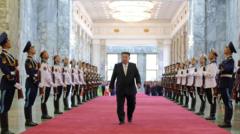Is North Korea Cracking Down on Foreign Films with Executions?

Published: 2025-09-12 09:18:11 | Category: world
The North Korean government is increasingly enforcing the death penalty, particularly for individuals caught watching or sharing foreign films and TV dramas. A recent UN report highlights severe human rights violations, including forced labour and pervasive surveillance, as the dictatorship tightens control over the lives of its citizens.
Last updated: 26 October 2023 (BST)
Key Takeaways
- The death penalty is now more frequently applied for crimes like watching foreign media.
- Surveillance technology has expanded, intensifying government control over citizens.
- Forced labour is more prevalent, with hazardous working conditions and recruitment of vulnerable populations.
- Human rights conditions have worsened since the end of diplomatic engagement with the West in 2019.
- The UN is calling for action from the international community to address these violations.
Increased Enforcement of the Death Penalty
The UN Human Rights Office's report reveals a disturbing trend: the North Korean government is using the death penalty more frequently. This includes the execution of individuals for watching and sharing foreign films. Since 2015, at least six new laws have been enacted that expand the scope of capital punishment.
Defectors report a notable increase in executions for distributing foreign content, particularly since 2020. These public executions, typically carried out by firing squads, serve as a brutal deterrent against dissent. For instance, Kang Gyuri, an escapee, witnessed her friends executed for possessing South Korean media. Such instances illustrate the extreme lengths to which the regime will go to maintain control over information.
Surveillance and Control Over Citizens’ Lives
The report asserts that no other population faces such stringent restrictions today. The regime's surveillance capabilities have reportedly grown due to advancements in technology, enabling more effective monitoring of citizens. An anonymous escapee detailed how these measures aim to suppress any signs of dissatisfaction or complaint among the populace.
Volker Türk, the UN High Commissioner for Human Rights, warns that if current trends continue, North Koreans will endure even greater suffering and repression. The pervasive nature of surveillance has left citizens feeling powerless, unable to make independent decisions regarding their economic, social, or political lives.
The Impact of Economic Policies and Food Insecurity
Despite initial hopes for improvement under Kim Jong Un’s leadership, conditions have significantly deteriorated. Many citizens face chronic food shortages, with regular meals considered a luxury. During the Covid-19 pandemic, food scarcity exacerbated the situation, leading to widespread hunger and even fatalities.
Government crackdowns on informal markets have further hindered families' ability to earn a living. These actions coincide with tightened border controls, making escape nearly impossible and resulting in orders for troops to shoot individuals attempting to cross into China.
As one young woman who escaped in 2018 noted, the government's measures transformed the act of living into a daily torment, with independence increasingly stifled.
Forced Labour and Human Rights Violations
The report also highlights an increase in forced labour in North Korea. Individuals from impoverished backgrounds are often recruited into "shock brigades" to perform physically demanding tasks in hazardous conditions, such as construction and mining projects. The regime's portrayal of these deaths as sacrifices for Kim Jong Un’s glory further compounds the tragic reality for these workers.
Recruitment of orphans and street children into these brigades raises serious ethical concerns about the exploitation of vulnerable populations. Many escapees report witnessing horrific conditions in political prison camps, where torture and malnutrition are commonplace. While there have been some reports of limited improvements, including a slight reduction in guard violence, the overall situation remains dire.
International Response and the Call for Change
The UN's findings reiterate the need for international action concerning North Korea's human rights violations. The ongoing existence of political prison camps, the use of the death penalty, and the necessity for human rights education are critical issues that the UN is urging the North Korean government to address.
However, the prospect of meaningful change remains uncertain. Since 2019, attempts to impose new sanctions on North Korea have been thwarted by permanent members of the UN Security Council, particularly China and Russia. Their support for Kim Jong Un's regime complicates the international community's ability to respond effectively.
Conclusion: A Disheartening Reality
As the situation in North Korea continues to deteriorate, the UN’s report serves as a stark reminder of the ongoing human rights crisis. The experiences shared by escapees highlight the pervasive fear and repression faced by citizens under Kim Jong Un's regime. With increasing enforcement of the death penalty and a tightening grip on freedoms, the future for North Koreans appears bleak.
As the international community grapples with how to address these violations, it is evident that the voices of young North Koreans yearning for change must be heard. What will it take for the global community to unite and take decisive action against these atrocities? #NorthKorea #HumanRights #UNReport
FAQs
What crimes can result in the death penalty in North Korea?
In North Korea, crimes such as watching and sharing foreign films, drug trafficking, and other serious offences can lead to the death penalty. Recent laws have broadened the scope of capital punishment significantly.
How has surveillance increased in North Korea?
The North Korean government has enhanced its surveillance capabilities through technological advancements, allowing for more effective monitoring of citizens' activities and communications, contributing to a climate of fear.
What is the state of food security in North Korea?
Food security in North Korea is critically low, with many citizens experiencing chronic hunger. Access to sufficient food has worsened, especially during the Covid-19 pandemic, leading to increased malnutrition and starvation.
What are "shock brigades" in North Korea?
"Shock brigades" refer to groups of individuals, often from impoverished backgrounds, who are forced into hazardous labour for government projects, such as construction and mining, under extremely dangerous conditions.
What actions is the UN taking regarding human rights in North Korea?
The UN is calling for the abolition of political prison camps, an end to the death penalty, and increased education about human rights for North Korean citizens, highlighting a strong desire for change among the population.



